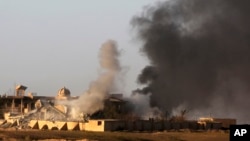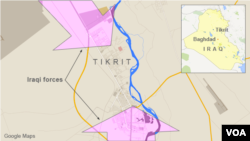U.S. warplanes joined Iraq's battle against the so-called 'Islamic State' in northern Iraq late Wednesday, as Iraqi ground troops launched a massive assault on Tikrit.
Analysts say the offensive could take the coalition a step further toward Mosul, the largest city held by the Islamic State militants. Others, however, say it could also deepen already dangerous sectarian tensions in the region.
Tikrit is the capital of Salahuddin province, an area located between the capital, Baghdad, and Iraq's second largest city of Mosul that has been controlled by Islamic State fighters since June.
At a press conference on a military air strip, Iraqi Defense Minister Khaled al-Obeidi said coalition and Iraqi airstrikes, and a massive Iraqi ground assault Wednesday, was the start of the "last page" of its battle for Iraqi cities and towns captured by the Islamic State last year.
They expect a victory, he said, but added that he cannot say how long it will take. He said if the Iraqi army takes Tikrit and other towns, then it plans to move on Mosul, a city of more than a million people.
Clashes intensified as Iraqi troops and special forces moved toward the city center, Lt. Gen. Abdul-Wahab al-Saadi told The Associated Press. Earlier Thursday, an Associated Press reporter heard a second round of airstrikes over Tikrit.
In an address late Wednesday, Iraq's Prime Minister Haider al-Abadi said Iraqi forces began the "final phase'' in the Tikrit offensive but did not acknowledge that coalition forces were playing a direct role. He said Iraqis, "and not anyone but you,'' will claim victory against the militant group.
The U.S. airstrikes came after Abadi requested support for a month-old offensive to retake the strategic area. Iraqi troops and Shi'ite militias had resisted asking for outside air support, but after quick gains outside Tikrit, the effort stalled.
U.S. Lt. Gen. James Terry, who commands the coalition effort, said the airstrikes will better enable the Iraqi forces to oust the militants.
"These strikes are intended to destroy ISIL strongholds with precision, thereby saving innocent Iraqi lives while minimizing collateral damage to infrastructure," he said, using an acronym for the Islamic State group.
A video released by the U.S. Department of Defense showed blasts on a bridge and in an area along a river. It said the bridge was controlled by Islamic State militants and said the area along the river was an Islamic State compound.
Pros, cons of Western support
Until Wednesday, the United States had supported the battle for Tikrit mostly from the sidelines, saying an eventual recapture of Mosul would be a massive blow for the militants.
However, political analyst Hisham Kassem said Western involvement could make this even more difficult because it may be seen as support for the military, which is largely manned by Shi'ite militiamen at the moment, over the Islamic State group, which claims to be Sunni.
“They are complicating the situation in the sense that the balance of power always has to have these calculations,” he said.
“The balance of power” is not only between religious groups locally, he added, but between two regional power-players; Shi'ite Iran, and Sunni Saudi Arabia.
Former Egyptian deputy foreign minister Ambassador Abdullah El-Ashaal said many Sunnis fear Iranian power inside Iraq.
“This why there is no coherence among the elements of the Iraqi army," he said. "Mainly they are Shi'ites, and the Sunnis are with ISIS, so they are half-hearted. The starting point is wrong because we need someone who looks at Iraq separate from the factional situation in Iraq.”
The Iraqi army is working to quell these fears by integrating Sunni and Shia forces as they continue to fight to topple the Islamic State group.
Psaki: 'significant impact'
State Department spokeswoman Jen Psaki said the bombings have had a "significant impact" on the Islamic State group, including killing thousands of the militants.
"The cumulative effect of these actions has been enormous," she said in a statement.
"ISIL can no longer operate freely in roughly 25 percent of populated areas of Iraqi territory where they once could," she added. "Its momentum has been blunted, its ability to mass and maneuver forces degraded, its leadership cells eliminated or pressured, and its supply lines severed."
Iran has trained and armed Shi'ite militias who have been fighting alongside Iraqi forces against Islamic State in Tikrit, but U.S. officials have stressed that the U.S. is not coordinating any military action with the Iranians.
The U.S.-led coalition has carried out about 1,700 airstrikes in Iraq since August.
IS Propaganda
In a propaganda video posted on YouTube early this year, British hostage John Cantlie appears to tour Mosul, calling it "bustling" under Islamic State rule.
“This is not a city living in fear as the Western media would have you believe," he said. "This is just a normal city going about its business.”
The video cannot be independently verified and Cantlie is believed to still be a prisoner of the Islamic State group.
Other videos believed to have been posted online by the group present a more frightening version of Islamic State rule, as reports of public stonings and beheadings trickle out of Mosul.
Carla Babb contributed to this report from the Pentagon, some material for this report came from the Associated Press.













